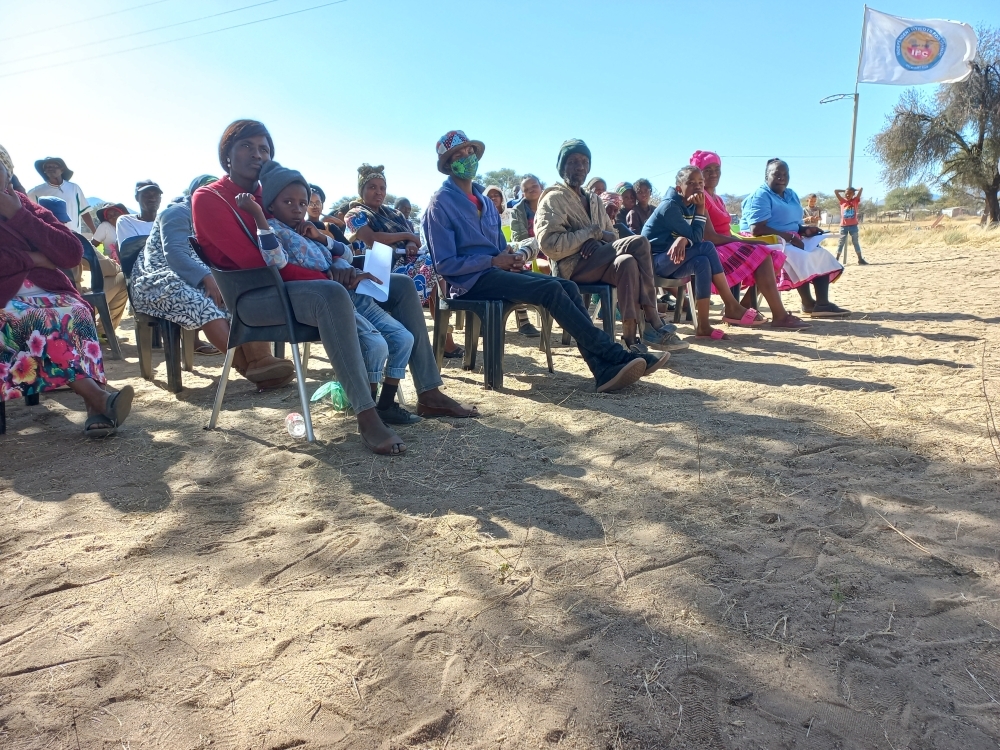Groot Aub residents list village miseries
The Independent Patriots for Change (IPC) has questioned the lack of development at the Groot Aub settlement five years after the village was transferred to the City of Windhoek.
As part of a community engagement event this past weekend, IPC councillors met with the community over the community to introduce IPC representatives serving on the council and to assess the needs of the community.
Residents highlighted issues worrying the community, including the alleged illegal transfer of land to new arrivals at the settlement, the frequent destruction of newly-built housing structures by city police officers, because of a lack of title deeds, and the lack of water and electricity.
Falling on deaf ears
Johanna Garoses, who has built a crèche at the settlement, said she could not get water or electricity connections for her facility, despite the critical work she undertakes for the community.
“We cannot get water from the main supply pipe. We even suggested laying our own pipes. We have no electricity for our structures and when we apply, we are being sent from pillar to post,” Garoses said.
“We also don’t have property ownership here in Groot Aub. Since 2017, we cannot build here in Groot Aub, even if a structure is damaged, we cannot fix it,” she added.
Another resident, Bonitha Goagoses, said there has been an influx of people from outside of the settlement who are acquiring land, while Groot Aub residents are not afforded the same opportunities.
Riana Janser, another resident, said it would only be fair for the settlement to be granted village council status.
“We don’t want the City of Windhoek, we want to get rid of Windhoek, give us village council status,” Janser said.
Questions asked
Addressing members of the settlement, IPC leader Panduleni Itula said he wanted to understand what the needs of the community were and why the settlement was still in its current state, despite its incorporation under the City of Windhoek in 2017.
“Why is there no development in Groot Aub? Is it because of the people of Groot Aub or is it because of the leadership that had managed the settlement?”, he asked.
IPC councillor Jürgen Hecht said it was likely that the settlement was integrated into Windhoek with very little planning.
“You must look around, you must plan, you have to do something strategic... they had five years and it seems very little was done,” Hecht said.
Councillor Ndeshihafela Larandja said the Groot Aub budget allocation is too small to cater to the needs of residents.
“The budget for Groot Aub is N$2 million, which really is not enough to do everything that you need because you cannot provide water, roads and electricity for the people,” Larandja said.
The settlement fell within the boundaries of Windhoek when it expanded its boundary in 2011. The settlement was proclaimed as an extension of Windhoek in 2017, despite widespread opposition from residents.
The village lies 50 kilometres south of Windhoek.
As part of a community engagement event this past weekend, IPC councillors met with the community over the community to introduce IPC representatives serving on the council and to assess the needs of the community.
Residents highlighted issues worrying the community, including the alleged illegal transfer of land to new arrivals at the settlement, the frequent destruction of newly-built housing structures by city police officers, because of a lack of title deeds, and the lack of water and electricity.
Falling on deaf ears
Johanna Garoses, who has built a crèche at the settlement, said she could not get water or electricity connections for her facility, despite the critical work she undertakes for the community.
“We cannot get water from the main supply pipe. We even suggested laying our own pipes. We have no electricity for our structures and when we apply, we are being sent from pillar to post,” Garoses said.
“We also don’t have property ownership here in Groot Aub. Since 2017, we cannot build here in Groot Aub, even if a structure is damaged, we cannot fix it,” she added.
Another resident, Bonitha Goagoses, said there has been an influx of people from outside of the settlement who are acquiring land, while Groot Aub residents are not afforded the same opportunities.
Riana Janser, another resident, said it would only be fair for the settlement to be granted village council status.
“We don’t want the City of Windhoek, we want to get rid of Windhoek, give us village council status,” Janser said.
Questions asked
Addressing members of the settlement, IPC leader Panduleni Itula said he wanted to understand what the needs of the community were and why the settlement was still in its current state, despite its incorporation under the City of Windhoek in 2017.
“Why is there no development in Groot Aub? Is it because of the people of Groot Aub or is it because of the leadership that had managed the settlement?”, he asked.
IPC councillor Jürgen Hecht said it was likely that the settlement was integrated into Windhoek with very little planning.
“You must look around, you must plan, you have to do something strategic... they had five years and it seems very little was done,” Hecht said.
Councillor Ndeshihafela Larandja said the Groot Aub budget allocation is too small to cater to the needs of residents.
“The budget for Groot Aub is N$2 million, which really is not enough to do everything that you need because you cannot provide water, roads and electricity for the people,” Larandja said.
The settlement fell within the boundaries of Windhoek when it expanded its boundary in 2011. The settlement was proclaimed as an extension of Windhoek in 2017, despite widespread opposition from residents.
The village lies 50 kilometres south of Windhoek.





Comments
Namibian Sun
No comments have been left on this article